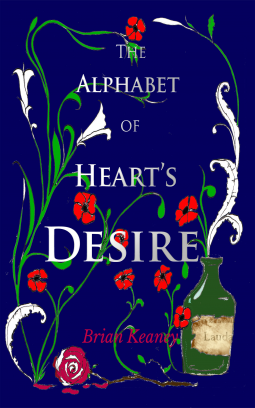I loved the concept of this. Take one unexplained event from the life of a literary genius, add a splash of fact and a generous dose of fiction, and bake, until the resulting mix has increased in size and scope a hundred times over. The Alphabet of Heart’s Desire follows three disparate characters and their intertwining lives in early 19th-century London. Tuah, an ex-slave; Anne, a prostitute; and a young Thomas de Quincey. Weaving through the story, dealing out pleasure and pain in equal measure, is the ominous presence of opium.

I was really excited to read this, having been introduced to Thomas de Quincey’s work while at university. I haven’t read ‘Confessions of an English Opium-Eater’ (which inspired this novel), but I loved his morbid satirical essay ‘On Murder Considered as one of the Fine Arts’. In preparation for this I tried to look up my study notes, but all I could find was an elusive reference to it in an essay on the poetry of Browning. Disappointing for me now, but no doubt at the time I thought my passing reference was very witty and intellectual.
The narrative is told from the perspective of each of the three main characters. Each character has an individual, if slightly contrived, voice. Tuah’s speech is peppered with the Bible verses introduced to him by the ship captain who taught him to speak English. Anne’s speech is full of the grammatical idiosyncracies one might expect from your run-of-the-mill 19th-century street urchin. She is a street urchin with learning, however, and every word that might be considered too erudite for her is italicised. I found this a little distracting, but I think it emphasises that however much she may learn the ways of the upper classes, she will never leave behind her impoverished roots. While Thomas might use those words naturally, for her they come from a world beyond her own. She cannot forget it, and neither can we.
The characters themselves are well developed, and while they do give a cross section of 19th-century society, they do not feel stereotyped. By far my favouite character was Archie, whose philosophy and wit were sunshine among the clouds. I thoroughly enjoyed his conversation with Tuah about reading having “cured” him of his hunchback. Seeing Tuah’s puzzlement, he responds, “You are tempted to point out that it is still there…Literature is the great leveller…for when I read I stand as straight and true as any man.”
The writing is good and often wryly funny, although I was rarely completely absorbed by it. The highlights are certainly the descriptions of early 19th-century life in London. Particularly the more unpleasant aspects. Racism, child sex, rape, torture. Keaney certainly doesn’t shy away from describing these in vivid, macabre detail, confronting the reader with the gritty reality we are often all too happy to ignore.
For me, the pacing felt a little off. I enjoyed exploring the backstories of each of these characters, but wasn’t fully invested until Thomas and Anne finally meet. It was a shame not to spend more time with this and the fall-out of their relationship. Since the consequences of this are not explored, the ending comes abruptly and is a little anti-climactic.
An enjoyable read for fans of literary historical fiction but this didn’t quite live up to my expectations.
Favourite quotation: “he lay down flat with his ear to the ground and listened. At first it was no more than a whisper, like the sound of the wind breathing through the sedge beside some ancient and forever sunless sea. But gradually the murmur grew and Thomas knew it then for what it was: the footsteps of all those who had ever walked, or ever would walk upon the face of the earth. He listened harder, knowing there was a meaning in those endlessly changing patterns, if only he could understand it.”
Brian Keaney, The Alphabet of Heart’s Desire (Holland House, 2017)
Thank you to Brian Keaney and Holland House via NetGalley for an advance copy in exchange for an honest review.